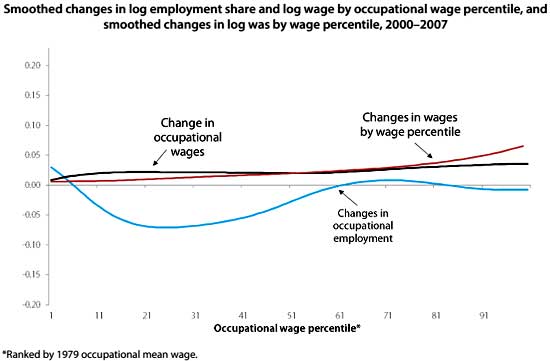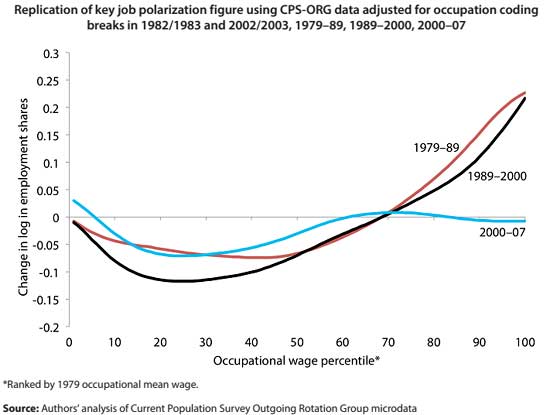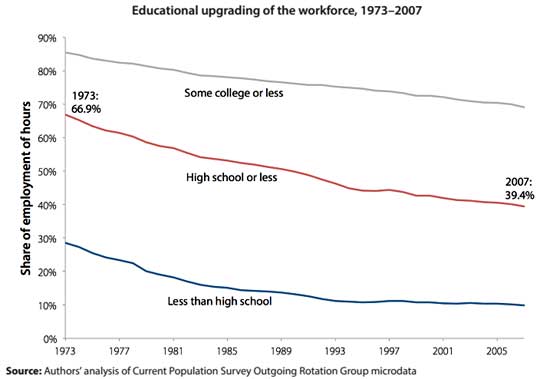In America today there is a crisis. That crisis is economic inequality. The U.S. workforce has been blamed and dismissed for the growing gap between rich and poor. Much effort has gone into blaming the victim. Americans have been called fat, lazy and stupid along with the never ending drumbeat claim U.S. workers are uneducated and do not have enough technological skills. The droning mantra to blame workers themselves for the growing income gap just got a loud blast of not so fast. Now a new study blows that blame the workers mantra out of the water. There is no evidence that technological shifts, a lack of education or the lack of technical skills is the cause of the great, growing cataclysmic chasm of income inequality in the United States.
Many economists contend that technology is the primary driver of the increase in wage inequality since the late 1970s, as technology-induced job skill requirements have outpaced the growing education levels of the workforce. The influential “skill-biased technological change” (SBTC) explanation claims that technology raises demand for educated workers, thus allowing them to command higher wages—which in turn increases wage inequality.
Current SBTC models do not adequately account for key wage patterns (namely, rising wage inequality) over the last three decades.
The great American workforce economic wipe out is not due to a lack of skills and education. This should be no surprise since America has the best higher education institutions in the world and is home to most of the technological innovations of the last 130 years.
The paper authors found these critical points, listed below, in their analysis of occupational statistics to show the great wage wipe out is not due to the American workforce:
- Technological and skill deficiency explanations of wage inequality have failed to explain key wage patterns over the last three decades, including the 2000s.
- History shows that middle-wage occupations have shrunk and higher-wage occupations have expanded since the 1950s. This has not driven any changed pattern of wage trends.
- Evidence for job polarization is weak.
- There was no occupational job polarization in the 2000s.
- Occupational employment trends do not drive wage patterns or wage inequality.
- Occupations have become less, not more, important determinants of wage patterns.
- An expanded demand for low-wage service occupations is not a key driver of wage trends.
- Occupational employment trends provide only limited insights into the main dynamics of the labor market, particularly wage trends.
Let's translate these findings into English for the research is dense. The first point means if skills were a driver of high salaries, we'd see increasing wages at the top of the occupational skill heap. That's not the case. The authors are also saying occupations are decoupling from wage levels. In other words no matter what your abilities, wages are static and flat and meritocracy may very well be dead. Workers are simply not being rewarded for their abilities and efforts on the job as they were in the past. The study authors also found crappy jobs, those low wage restaurant worker and big box store type of occupations, are not the reason for the great and growing wage gap. Paychecks in the middle and the top occupations have not increased much, that's the bottom line.
Relative employment in all low-wage occupations, taken together, has been stable for the last three decades, representing a 21.1 percent share of total employment in 1979, 19.7 percent in 1999, and 20.0 percent in 2007. Second, the expansion of service occupation employment has not driven their wage levels and therefore has not driven overall wage patterns.
One graph from the paper spells it out, wages are flat regardless of how educated one is, how skilled one is. The below graph shows occupations broken down by skill percentile. The higher the percentile on the bottom line, the more that occupation requires advanced college degrees and advanced skill sets. The scale on the left of the graph shows the percentage change from 2000 until year 2007. The black line represents the change in wages as we go up the skill requirement percentile line and the red line are wage changes per actual occupation percentile from 2000 to 2007. The blue line is the change in employment as a percentage of the work force. Bottom line since year 2000 there has been a flat line change in wages, across the board.

If technological shifts and a lack of skills or education were to blame for the growing gap between rich and poor, the above graph would show increasing wages for the jobs requiring the most advanced degrees and jobs skills. Such is not the case.
Job polarization is when there are lots of jobs with very high skills and lots of jobs which require low skills and this is relative to the middle skilled jobs, which have declined. In other words, there would be more Research jobs and more burger flipper jobs, yet less in the middle of the skill range sorts of occupations. Occupations which require high skills should correspond to high wages and conversely unskilled labor jobs should show low wages. If one graphs initial wages per occupation by skill requirements against increased employment, it should result in a U shape graph if job polarization exists. The below shows this is not the case starting around year 2000.

Another graph which exposes the great lie Americans are not highly skilled and educated is the below, showing the dramatic increase in workers' education levels. Think about putting people on the moon and the innovations of the 1950's. Not only were these people Americans, very often they had Bachelors degrees and less. Workers are much more educated than they were in 1973, yet income inequality has dramatically increased. In other words clearly it is not the lack of an educated workforce which explains growing economic inequality in America.

The authors blast the typical rhetoric and claims made by those wanting income inequality to be about a skills gap. In particular they point out the flawed model used to come up with such spurious conclusions.
We also note that Autor and Acemoglu do not consider several additional critiques of the “canonical model,” particularly: (1) the failure of education wage differentials to capture much, if not the majority, of the growth of wage inequality, which happened among workers with similar education and experience (so called “within-group” wage inequality); (2) the failure to explain the extraordinary rise of wages among the top 1 percent of earners; and (3) the possibility that observed education wage gaps could be driven by factors other than changes in the price of skills, including changes in the minimum wage and unionization, industry deregulation, and globalization, all of which could affect relative wages by education but have nothing to do with technological change.
The authors also found increasing wage inequality within the same occupation, the same work. They also discovered a general decoupling of job type to wage and reward. In other words, for all folks getting a paycheck, everyone is suffering economically. It is an illusion, a lie that you're broke due to a lack of ability, knowledge and training.
We find that the importance of occupations in explaining wage variance slowed in the 1990s and reversed somewhat in the 2000s, and that a large and increasing share of the increase in wage inequality in recent decades is occurring within occupations,
There is much more to the paper and the work is dense. Yet the author's conclusions have been validated by other methods. As they say, don't blame the robots for the growing income inequality problem of the United States. The problem is not workers and technological shifts. The Census occupational statistics will bear that much out when using accurate analysis and models. The paper also notes wage trends just are not explaining what is happening to the U.S. labor market overall and that the reason for repressed wages must be found elsewhere. Blaming workers and robots for the never ending gap between rich and poor is just another tall tale. Skill-biased technological change is yet another fairy story to add to the mythology being crafted in order to justify wiping out the America middle class to the point of extinction.


Comments
unbelievable!
We moderate and limit anonymous comments on this site, for example, no links, for good reason. We have people, Americans, claiming it is true that other Americans are fat, lazy and stupid! These are not allowed on the site as abusive, but may I just say this to those commenters:
Maybe YOU are, but no, that is clearly and obviously false. The U.S. workforce has the least amount of vacation days, terrible benefits and busts their ass more than almost every other country. Goes to show how the great propaganda war to put down the U.S. worker and blame the victim has succeeded.
Hmmm, let's see, do you also care to call all veterans the same names?
Care to comment on high fructose corn syrup or putting empty calories and fat calories in most foods, including trans fat in most baked goods, in America, commonly banned in other countries?
Just unbelievable how hypnotized Americans are to name call and put down their fellow citizens.
SOP
standard operating procedure for the elites ... divide and conquer the poor and middle class by pitting them against one another.
As Jay Gould so eloquently phrased it: "I can hire one half of the working class to kill the other half."
same old playbook
After spending my total
After spending my total career in the 'high-tech/computer' industry (mostly management), I totally agree with the findings in this article. At this point in time, when one changes jobs, there is seldom a significant salary increase. Rather than pay an American engineer prevailing US wages, corporations will either hire a contractor from a firm such as Tata or outsource the job itself to India.
If you are looking for an example of a country where this 'outsourcing' is much less prevalent and the corresponding results, look at Germany.
Obama jumped on economic inequality as the U.S. biggest problem
#inequality, Of course beyond changing the corporate and personal tax code to tax the rich and yes, this it the #number one cause of income inequality is the U.S. tax code, Obama is promoting policies to further destroy the U.S. middle class. His top focus is to increase massively foreign guest worker Visas and foreign workers who are, yes they are, competing for the meager amount of jobs in the U.S., enabling labor arbitrage. Yes, this is why #Facebook wants massive immigration, not any social-moral reason.
Obama is also promoting more bad trade deals which offshore outsource even more jobs and subtract from the economy. Finally, we have Wall street getting all of the perks from the Obama administration, same as Bush. So, we have some nice rhetoric going with a few good ideas in front of a slew of bad ones.
His donors/buddies could't care less about us - thus he doesn't
The same banksters and corporate honchos from around the globe that donate to both D & R still run the show. I mean would any politician of any stripe that collects loot from Dimon, Blankfein, etc. really care what the "little people" do or how we struggle? They have their meetings at the House or on the golf course or in the clubs, the pols tell the honchos, "Look, I need to bash you in the press for a few days, but I still love you guys and keep the money flowing." It's a puppet show that I no longer buy tickets for because it's been played out thousands of times by now.
If Bill Gates claims he can't find a single American in the entire globe that is willing to work or has an IQ over 100, by God, his puppet(s) will go along with the lie. If Bill Gates can testify in front of his Congress that he needs to flood America with millions of visa recipients because Americans can't tie their own shoes, his Congress will issue more visas. If he says he'll ship every job in the US overseas if he doesn't get his way with more tax breaks, by God his Congress and President and state pols will go along with the lie and for the ride. We don't matter except for a throw-away line in a speech here or there. Yup, despite all the degrees and experience and work ethic, many of us can look forward to busting ass in jobs that would break people like Gates or Dimon or Pelosi or Obama within the first week. And we ain't all morons that sit their in awe of these people in power either, see, we CAN TIE OUR OWN SHOES! Look at me, I can think too and I don't sh*t on fellow Americans, wow! It's possible!
We look forward to being unemployed when we dare ask for a living wage. We look forward to being slandered by our sell-out corrupt politicians and treasonous CEOs. And we look forward to being physically broken with no medical coverage when we can no longer work or can't find work anymore because we reached our expiration date. Politicians? CEOs? Who cares, I trust people that bust their asses struggling every day from all walks of life before I'd ever trust one of those clowns to not screw me over or steal my $ when my back was turned.
It's pretty bad, no doubt
Corporations and corruption are destroying America at this point and most of America from the polls knows this and knows Congress is corrupt, yet districts are so gerrymandered and the political corruption so deep, no way to get them out with sane public service minded people. Worse, it is obvious most of America is easily hoodwinked, manipulated by media/propaganda, which these days are pretty much what political campaigns are. I think that frightens most, how easily the masses are manipulated.
Tax the rich!
I thought that 47% of Americans did not pay any taxes(most have a negative tax rate). I also thought that the 1% richest Americans paid 40% of all taxes.